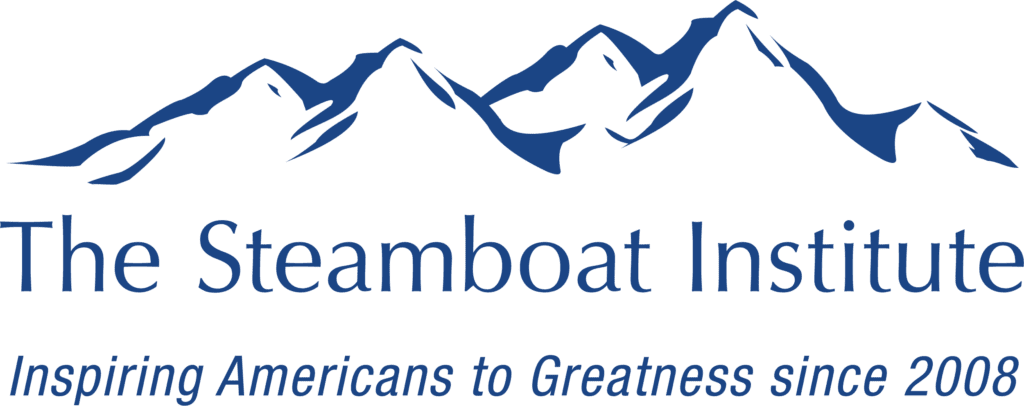Campus Liberty Tour Debate Recap: Social Justice and Identity Politics
April 27, 2021
by Marko Sukovic, a member of the Emerging Leaders Council
Wall Street Journal columnist and Manhattan Institute senior fellow Jason Riley and former Chairwoman of the Democratic National Committee (DNC) Donna Brazile engaged in a lively discussion about the current state of the social justice movement and what resemblance it bears, if any, to the civil rights movements of the 1950’s and 1960’s.
Hosted by the Steamboat Institute and the University of Colorado Boulder Benson Center and moderated by Tony Blankley Fellow Patrice Onwuka, the conversation covered a range of topics, including criminal justice and police reform, economic empowerment, affirmative action, voting rights initiatives and demographic trends in the black community.
Brazile opened the evening by describing the origins of the social justice movement, which she explained arose organically and in response to the pain of 400 years of slavery, Jim Crowe policies and discrimination that still persists today. Today’s social justice advocates, she commented, are less known than the leaders of the 50’s and 60’s, but are motivated by the “urgency of now.”
“It is not enough to be anti-racist,” Brazile said, “we must be pro-justice.”
A Roman Catholic and 5th generation American, Brazile stated that while she was proud of certain advances in policy and race relations that have been made since her childhood, that there was much more work still be done to “open the door” to political and economic opportunities for minorities.
Riley began his remarks outlining what he believed was an important distinction in approach between today’s social justice advocates, including those involved with Black Lives Matter, and the civil rights movement of Martin Luther King, Jr.’s time. He contended that King and other leaders of his period made a point about recognizing the role that black Americans played to improve their own station, notwithstanding racism and the legacy of slavery. He explained that today’s social justice movement, and the media establishment that promotes its narrative, only play lip service to this responsibility.
Riley went on to say that the challenges facing the black community today are not civil rights issues in nature, and that they extend beyond “past moral failings.”
Onwuka then proceeded to moderate a question and answer period that zeroed in on the goals of today’s social justice advocates. How could the goals of today’s social justice movement be characterized, as either in pursuit of equity or in pursuit of equality, and what are the ensuing implications?
Brazile highlighted concerns about disproportionate outcomes and leveled a critique of institutions that are still leaving too many behind, “on the outskirts of hope.” She argued that 40 years of corrective policy has not erred the legacy of the last 400 years, and that the work of today’s social justice movement has been to provide economic empowerment. Brazile cited discrepancies in the insurance and banking sectors, among other places.
Dissecting affirmative action policies, Riley posited that policies designed with equity in mind, or equal outcomes, are necessarily ones that discriminate and produce a zero-sum outcome.
Riley cited the shortcomings of affirmative action policies at the University of California system and examined a lawsuit that students at Harvard had filed against the university. The lawsuit contends that Harvard’s admissions policy discriminates against Asian students, and Riley explained that there appeared to be merit to the case. While as a percentage of the overall U.S. population Asian Americans are increasing their share, their rate of admission to Harvard has remained conspicuously the same.
Riley argued that the disproportionate outcomes today are best attributed, and more likely now more than ever before, to factors more nuanced than discrimination. He continued on, saying that opportunities are now more prevalent than ever before for black Americans, and that the real way to tackle the concerns that Brazile outlined was to better prepare them early in their childhood.
The evening concluded with questions from the audience and from those who listened to the panel discussion online. The importance of two-parent households was discussed, as was black American attitudes toward marriage and child-rearing. Both panelists found common ground here, with Brazile sharing her a story about her own personal upbringing and the role her parents played to get her and her siblings through college.
The Steamboat Institute’s in-person programming continues on June 17th in Steamboat Springs, CO with “Backlash: How China’s Aggression Has Backfired,” a presentation and book-Signing with China expert Helen Raleigh. To learn more about this event and to RSVP, please click here.
Register for Email Updates
Get the latest Steamboat Institute events, media, and updates emailed to you.
Support Us
Please consider making a tax-deductible donation to the Steamboat Institute. Your support helps us defend liberty and promote our nation’s first principles.

